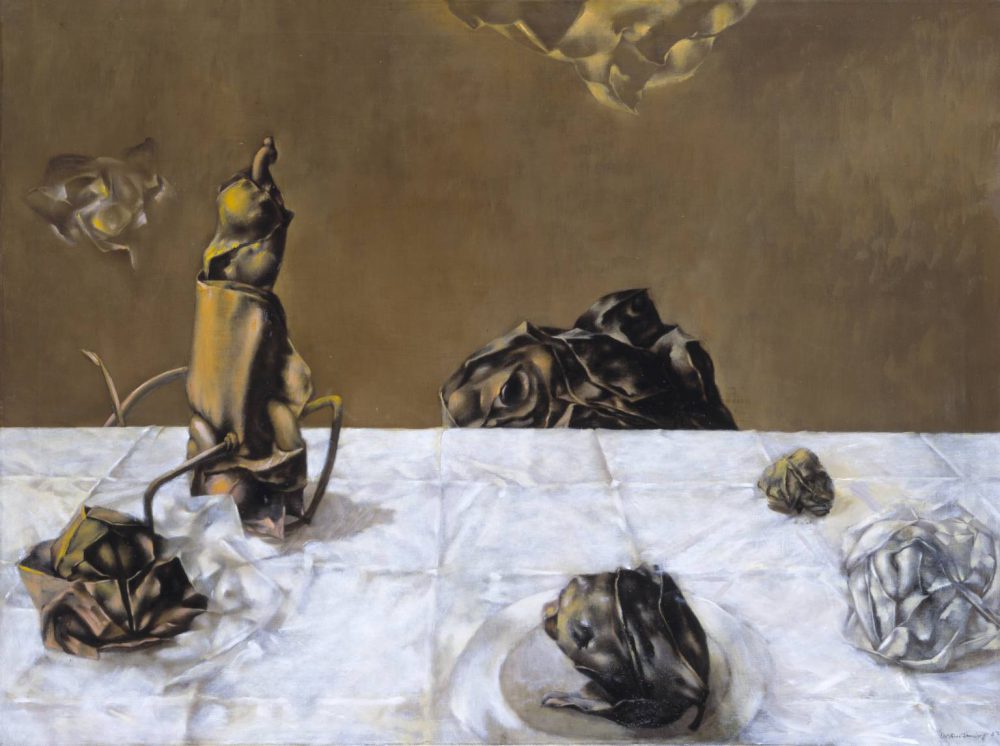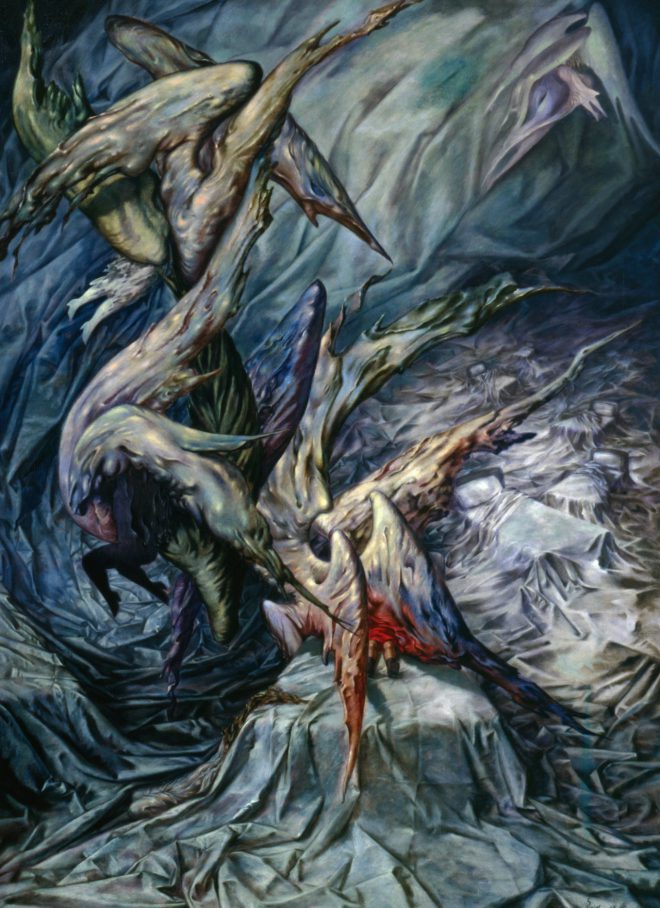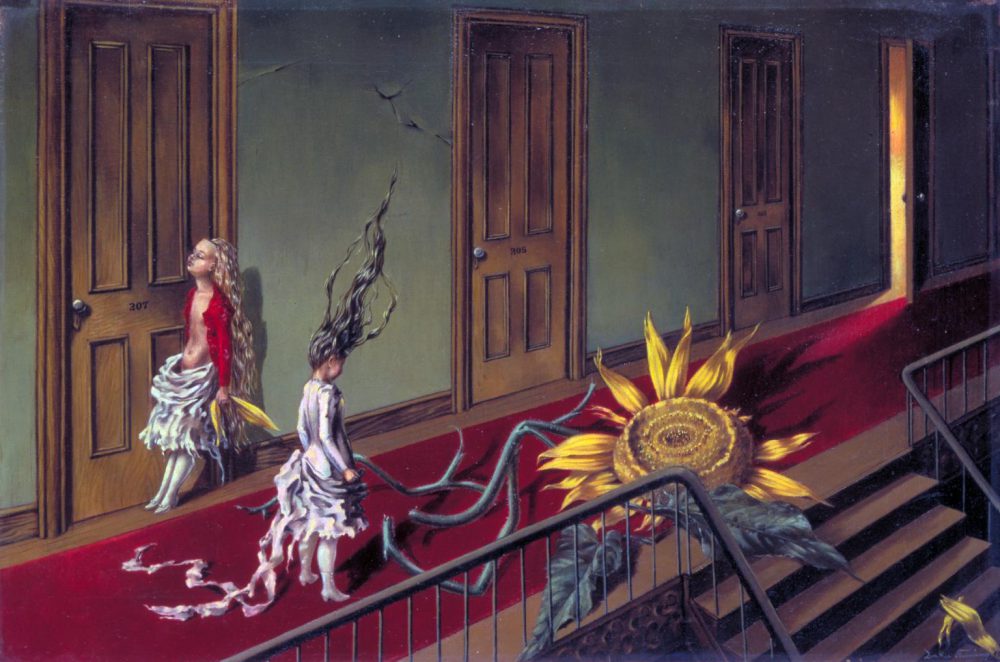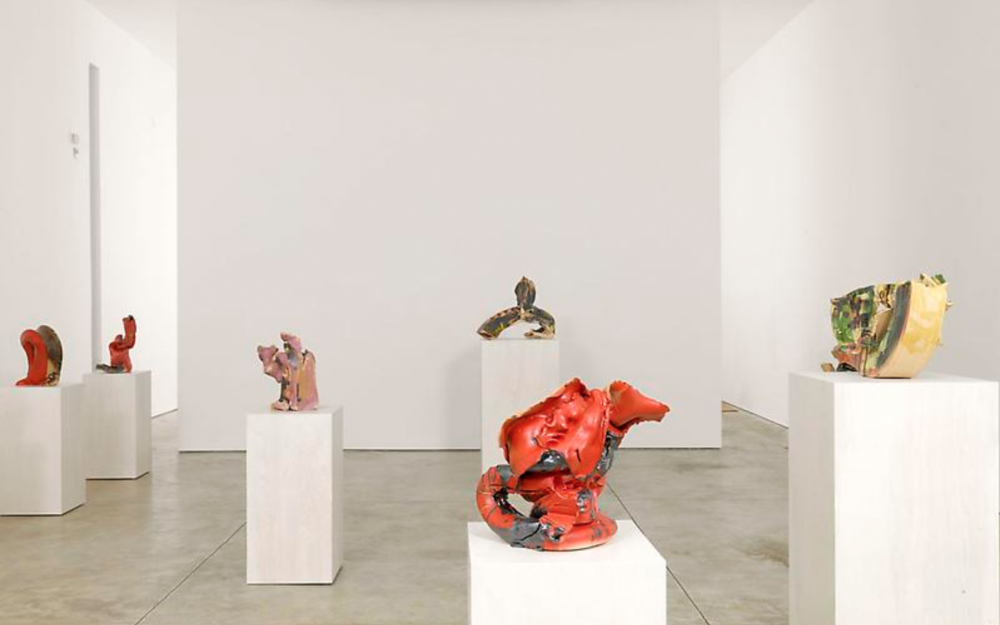A Reading of Grief
Taylor Murrow visits a psychic in New Orleans and reflects on different ways to understand grief and loss.

Dorothea Tanning, Some Roses and Their Phantoms, 1952. Oil on canvas. Collection of Tate, London.
“She said it was like living with a terrorist.” This is what the psychic tells me on Christmas Eve. She adjusts her glasses. Her eyes are blue and kind; her hair is blonde and full.
The psychic is referring to my mother, who has been dead now for over a year. It took me this long to work up the courage—and the money, frankly, because it turns out mediums are not cheap—to schedule a reading.
When I told people I was going to do this, they all looked a bit scared for me, like I was only inviting more pain and anguish into my life. But I don’t see it that way. I don’t know much about the “stages” of grief: That implies that grieving is like climbing a ladder; you make it to the top and you’re done. But grief is more nuanced. My grief is more like a house with many rooms, each wallpapered just a little differently. “This could make or break your Christmas,” my best friend told me with a laugh. I laughed with her. She’s not wrong to say that. But the holidays are not the same for me anyway so I wasn’t worried. What’s the difference between December 24 and any other day?
Like others, I’ve watched the circus of TV psychics throughout the years. There was the late Sylvia Browne, frequent guest of The Montel Williams Show with her long acrylic nails and raspy voice; John Edward, the Crossing Over guy; the Long Island Medium.... Are psychics legit? Probably not. But it’s still intriguing to watch and imagine a collection of spirits hanging out in some otherworldly realm, just waiting to be tapped on the shoulder by a human messenger. As a child, the concept of death and the afterlife was as confounding to me as black holes. And that’s how I imagined being dead—an endless black hole of nothingness, for eternity. There has to be something else, right?
“She said the medicines did not work. No matter what she tried. She never knew when the depression would hit, and, when it did, it was like living with a terrorist. She felt like a hostage in her own body.” This is how the psychic describes my mother—or her spirit? I’m still a little fuzzy on the details of how communicating with the dead works, and during the reading I’m too nervous to ask the right questions. I don’t really know what the right questions are anyway. For an experience I’ve thought about and prepared myself for over the last year, I clearly haven’t thought it through enough.
So, I listen and nod as this kind woman tells me what living with manic depression was like for my mother, as told to her by my mother. I understand the words she is saying, words that are not surprising or untrue. I am not going into this experience looking to prove that psychics are fraudulent or that this particular psychic is fraudulent. Nor am I expecting a profound message from my dead mom. I’m just looking for the experience; I’m searching for a new grief house to sleep in. My mother’s death was sudden and shocking, but not unexpected. I’ve grieved for her as long as I can remember, and when you mourn your whole life, you search for new ways to explore that loss.

Dorothea Tanning, Guardian Angels, 1946. Oil on canvas. Collection of the New Orleans Museum of Art.
The psychic looks calmly into my eyes. We are in her office, in a building in downtown New Orleans. Her walls are pink; her computer is pink; her blouse is pink. She lowers her glasses, narrows her gaze. “I want you to know that there is no special place for people who die certain ways. There is no purgatory. There is only one place, and it is a place of love.” Her words are meant to comfort, to calm my mind. But I do not imagine that my mother is in hell. I’m not sure what I imagine.
I was loosely raised Catholic—at my grandma’s insistence. She’s the only one who still regularly goes to church, and she’s not even sure if she believes at this point. But I guess when you have nowhere else to turn, it’s an option.
My grandma told me, the day after my mom died, that she heard a knock at her door in the middle of the night. But no one was there. And then she knew.
“I want you to know that she was always going to die this way.” More words of encouragement? Alright. Again, this is something I always felt. My mother and I had never had a “normal” relationship. We could not go out to lunch together. We could not have family holidays in the traditional sense, or any sense. My mother was an incredibly loving mother. Emotions flowed through her freely, intensely. But there were limits to her love—another thing she and I had both grieved for long ago.
I think about self-care. Isn’t seeing a psychic who might be able to communicate with your dead mother a form of self-care? My mother, who had no health insurance the last several years of her life, had limited options. It’s so hard to simply receive help, no matter how much you ask for it. Private facilities drained my grandmother’s bank accounts. As if it wasn’t hard enough for someone to ask for help in the first place.
“To be honest, the way she left this earth was not a terrible way to go,” she assures me and laughs. “I know it sounds terrible, but I have seen so many different ways to die.”
At this point, my heart is racing, as it does every time I imagine the moment my mom died, and her last violent breaths. This woman has earned enough of my trust because she has comforted me without coddling me. She does not call me “darling” or “dear.” She maintains a level of professionalism that reminds me that this is her job. We are here in her office, located in a downtown office building. She has a receptionist. Death is as inevitable and mundane as an appointment at a downtown office building, and she reminds me of this. There are so many ways to die.

Dorothea Tanning, Eine Kleine Nachtmusik, 1943. Oil on canvas. Collection of Tate, London.
When I was in the second grade, Mom checked herself into a rehab facility on the Northshore for a summer. I lived with my grandmother then and occasionally visited my mom. While she was gone, my mom wrote me letters, and for years I kept them in my purse at all times. There’s not much for a preteen to carry in a purse, but those letters were there. When I was in middle school, my purse got stolen. I later found the green, fake-suede bag—a Walmart purchase I was particularly pleased with that year—in a garbage can outside of the school gym. The letters, along with everything else, were gone.
During our reading, the psychic helpfully takes notes, which she will give me at the end of our session. I imagine she realizes that her clients might not always be in the best state of mind for note-taking, so I appreciate this. Later, I will keep the notes in my wallet, in my purse—with me at all times.
Your mom walked in with you and is your guardian angel. She says she was just exhausted. She was being held hostage by her brain. Her mental illness was terminal. She is with her sister and father and her grandmother and another male (her partner).
She just went to sleep and passed.
You didn’t have a choice to sell her house. You had to do it. She is very sorry that she left you with a mess to figure out and deal with and she is very proud of you the way you are handling everything.
I worked at a museum for six years, and I often took the works of art that surrounded me for granted. Art is a refuge, an escape and an exploration into the depths. One of my favorite pieces there is Dorothea Tanning’s Guardian Angels, 1946. The steely, melancholic colors, the sinewy brushstrokes—Tanning’s painting is all muscle and viscera, a cacophony of wings and figures. This, what I imagine watches over both of us, comforts me more than any thought of a glowing white mother figure in an iridescent gown and golden halo.



